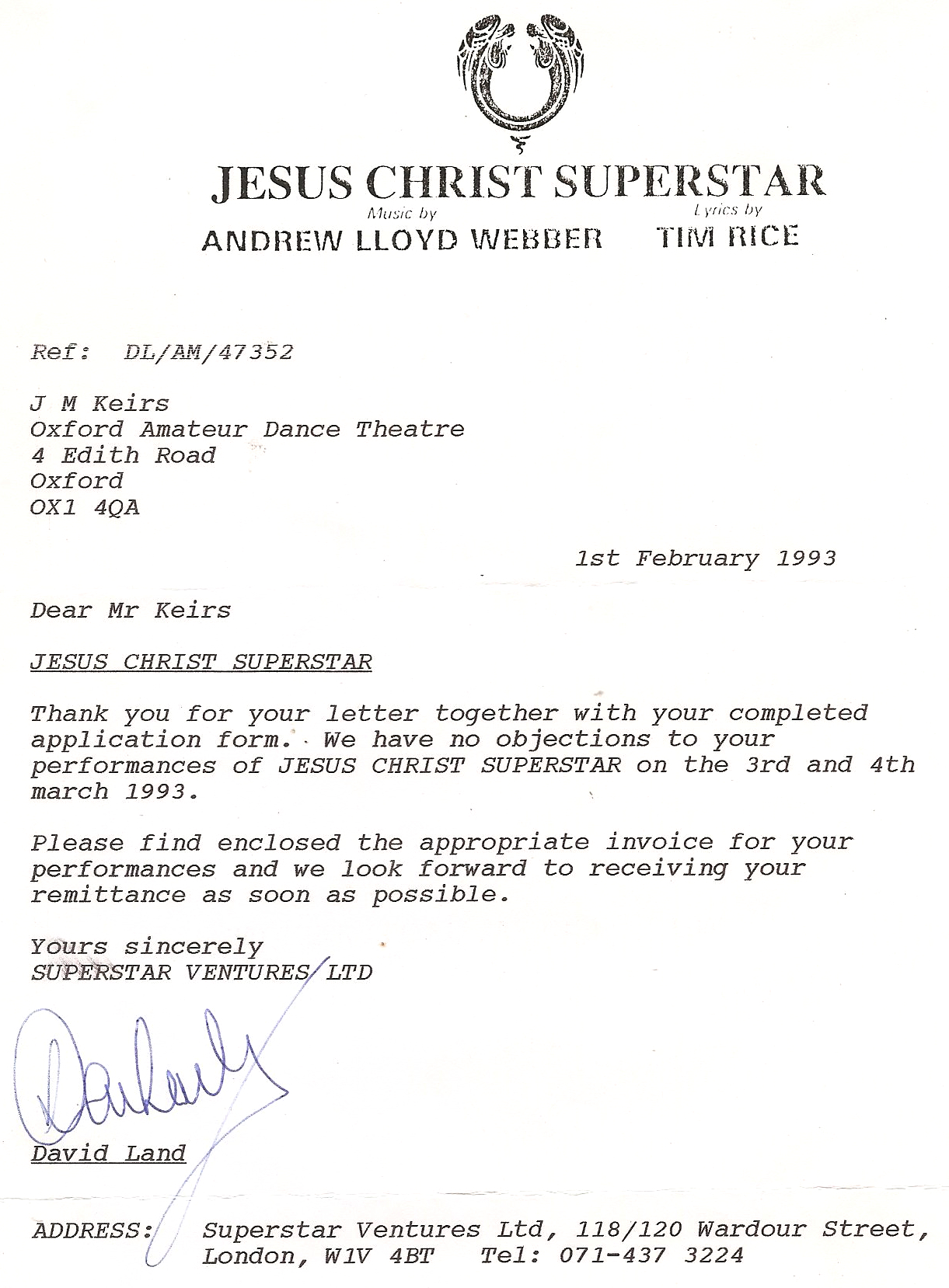
The letter (after 3 years of correspondance with David Laud,
a very patient Superstar Ventures Ltd. clerk - see text for details)
finally granting permission for ODT to do the show. Strange that after all
that time I should be addressed as Mr. Keirs but there y'go ...
‘We’ve commissioned ambitious plays that reach out to embrace the audience and we’ve built an environment for them that is exciting, welcoming and flexible – a theatre that can be changed to suit the show.’
‘New flexible theatre aims to get close to audience.’ Sir Nicholas Hytner, October 2018 article in The Independent.
I have great admiration for Sir Nicholas, whose lectures I attended when he was Oxford University Professor of Drama in the ‘90s. But I would question his apparent feeling that Promenade performance (theatre as an empty space in which audience members participate on an equal footing – literally! – with actors) is something new. Were not the mediaeval mystery plays the original Promenade performances, the audiences following members of different guilds as they acted on ‘pageant wagons’, travelling through the streets of Chester, York and Coventry?
I had seen a West End production of Jesus Christ Superstar in the early ‘90s and was ultimately disappointed. Set behind a proscenium arch it came over as just another heavily miked picture, making no real contact with the audience – boring! However, this disappointment got me thinking and eventually motivated me to direct the musical as I did, staging it as a Promenade performance. In this way the audience would become totally involved in the last few days of Jesus’ life, first as his adoring ‘fans’ shouting ‘Hosanna’, but eventually as the mob hounding him to his death. This would create a much more enthralling experience for everyone …
'The number of shows suitable for Promenade performance is probably small, but Jesus Christ Superstar is certainly one that gains enormously. The power of the Star lies in the rapport with the crowd, and by involving the audience in the movement and dance, this power is made concrete; likewise the fact that crowd and audience can be manipulated by the music and by displays of violence. The pulsing rhythms of the rock group improvising from a piano score with ingenuity and panache will persuade us of anything.’
Henry Blyth - Daily Information
Getting things to happen was a long journey. Three years after my decision to stage the show (applying for permission, being rejected, applying again etc.), I finally had a phone call out of the blue to say that if I were to perform in a church or school, permission would be granted … I had felt all along that the Newman Rooms/Catholic Chaplaincy (which I had used for West Side Story and other musical theatre pieces over the years) would be exactly right for my imagined version of Superstar, and knew of course that it was a consecrated space. Sadly, I hadn’t thought of checking the rules and making this clear to Superstar Ventures from the very beginning. We live and learn …
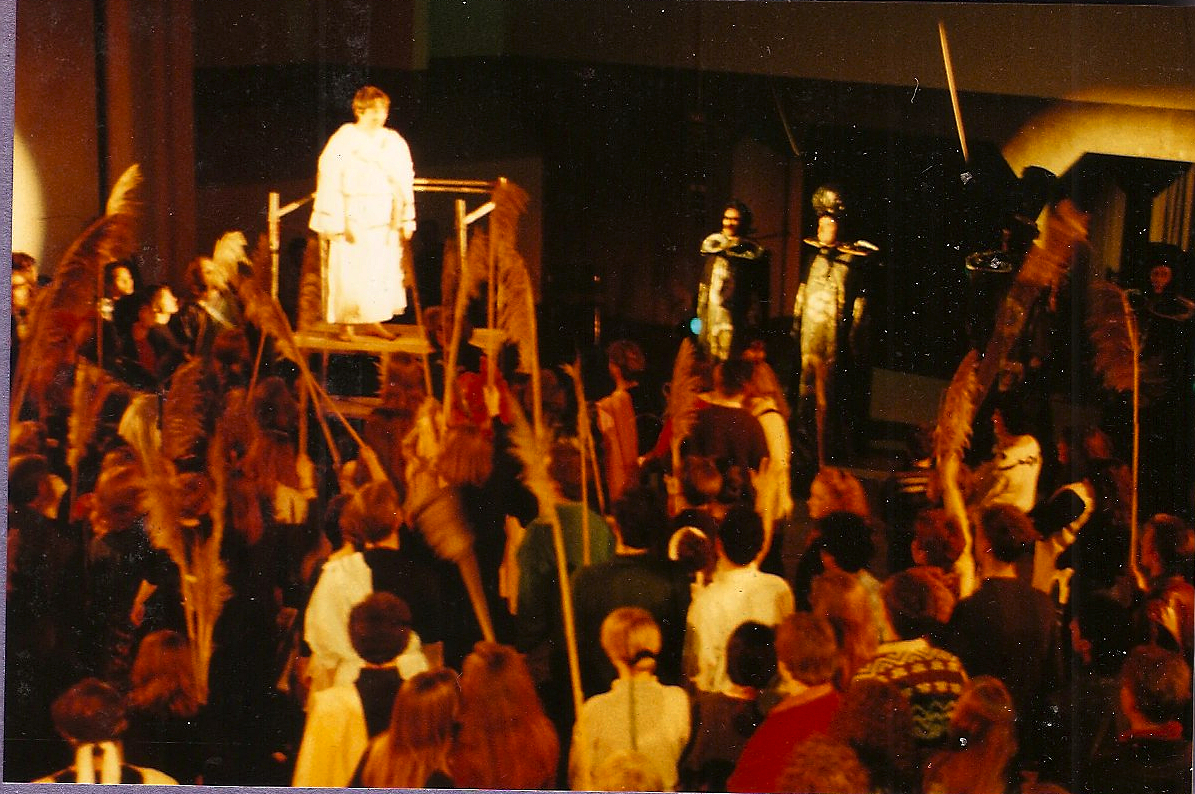
a reverential crowd (the audience) waving palm fronds.
I have to say that over the years leading up to production I did receive a series of heart-warming letters from an agreeable Superstar Ventures clerk, apologising for ‘any delay or confusion’. One of the first starts: ‘You say I do not feel I can grant you a licence; I do not feel anything’ (very Beckett ...) and ends by saying, ‘I am very sorry I cannot be more helpful.’ In another he vents his frustration: ‘Thank you for your note of 1st March 1993. I know my letters sound confusing but I can assure you that the notes I get from The Really Useful Group and Andrew Lloyd Webber and Tim Rice are just as confusing … Anyway I am not going to raise any false hopes but could you please complete the enclosed form and I will bring it up at the next meeting. I will probably get thrown out with it but I will bring it up.’
How nice. Once permission had finally been granted, this correspondence was more or less forgotten. Now, however, if, after twenty-five years, David Laud is still working for the company, I do hope he manages to keep his letter-writing to the many groups still wanting to perform Superstar equally sensitive and polite!
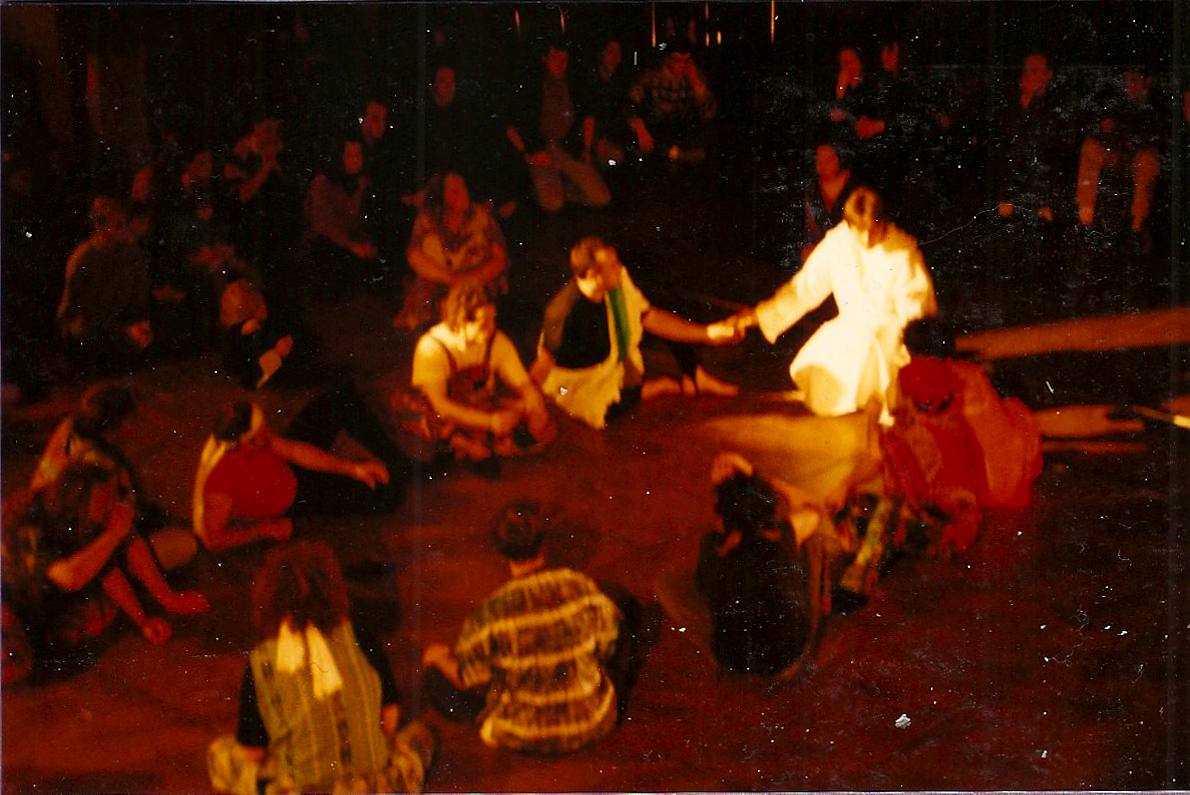
A large, bare, neutral space, the Newman Rooms were the perfect venue for the mobile production I envisaged. In performance, cast and audience, with children bearing palms, ribbons and streamers, welcomed Jesus with cries of ‘Hosanna!’ as Jesus entered with his disciples on Palm Sunday. Cast and audience formed a mob in the Temple where, from the height of the one stage prop, a piece of industrial scaffolding, he sternly rebuked them for looting Jerusalem’s holy places. Cast and audience completed the ‘table’, sitting on the floor of the hall with Jesus, Judas and the other disciples at the Last Supper, bearing witness to the first Communion and the altercation between Jesus and Judas. Cast and audience were present at Gethsemane, observing Peter’s denial, supporting Pilate’s conviction of Jesus, the Trial, the Lashes, the Crucifixion and finally JC’s elevation to the status of Superstar. So the audience took an active part in the whole story from Palm Sunday to the Crucifixion, being involved, participating, ‘living’ the action, which is as I felt it should be.
One critic said, ‘Jesus Christ Superstar is an ideal show for such a presentation because the crowd is a dynamic focal point of the work and the spacious Newman Rooms offer the ideal space for a production of this scope’.
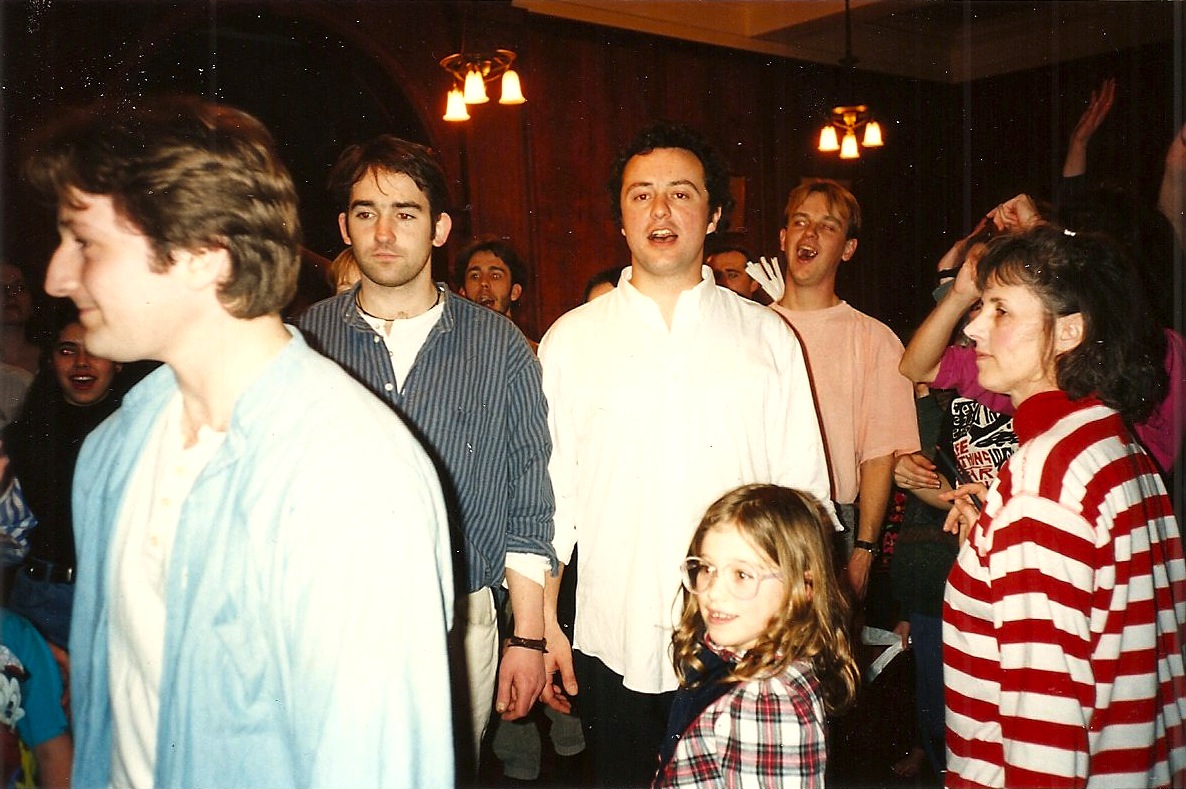
Judas (Jig Cochrane), disciples and crowd.
As I had written in a preliminary note for the cast, ‘I first had the idea of directing JC Superstar in 1991, but it has taken three years for the opportunity to obtain the rights and the chance to work in this space to come together. And it is the idea of the possibilities that occur when people meet in a space like this that has been my constant inspiration, together with a deeply felt desire to allow people to experience the richness of sharing.’
We were very lucky to have talented musicians in the student band, led by Dave Gaydon, who were happy to play for free. (At that time I hadn’t got into the habit of actually paying musicians; I couldn’t understand why performers should give up so much time to perfecting an event, for mutual enjoyment, not cash, while musicians had to be paid! Did this mean that they didn’t like what they were doing? This was another learning curve for me …) However the cast had a whip round and gave them the amazing sum of £50, which of course they thoroughly deserved.
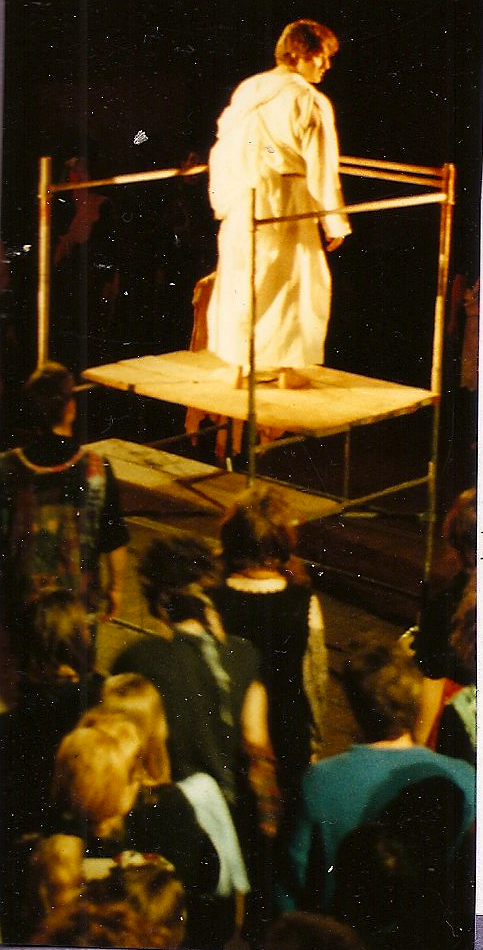
berating the crowd (the audience)
There were wonderfully evocative ‘cheap and cheerful’ costumes made to great effect out of tie-dyed cloth; these changed from night to night, as the wardrobe mistress, Charlotte Perkins, so much relished transforming them daily with a variety of colourful patterns.
We were fortunate to have gifted leads: Darren Wood, who, according to Daily Information critic, as Jesus ‘walked with a massive integrity, ironic, and with a will and character far stronger than any popstar’; James (Jig) Cochrane, singer in a local rock group, as Judas, acting with tremendous power and charisma; Zabarjad Salam as a warm and sensuous Mary Magdalene. And the ‘choir’ – the disciples and disciples’ groupies – were terrific.
Robert Bristow as Pilate has an interesting take on his performance. He was alone on the small, high balcony. ‘For my own part, as a keen singer, I was at first dismayed to be confined to a high pulpit for the duration of the show, from which Pilate was to appear… I wanted to be joining in and adding my voice to the chorus numbers! However I came to realise that the separation from the rest of the cast was the perfect device for producing the character and sentiment of Pontius Pilate – it automatically created the sense of isolation and loneliness that is so important to the portrayal of the character in the musical, and made my appearance, when it did come, so much more powerful and meaningful.’
Not everything was perfect of course. The very tall, impressive guy playing the High Priest looked magnificent, so was chosen at audition. This was a mistake on my part … Looks are very important to me, maybe again because I come from a dance background(?). However I should have at least made sure that he could sing - which he couldn’t. Despite assuring me that he ‘would take lessons’, there was no improvement, so sadly he had virtually to speak his part in a rather flat, toneless voice. This was much to the annoyance of the other three priests, who were doing their best to sing their songs, but struggling as they were stationed at the end of the hall farthest away from the musicians.
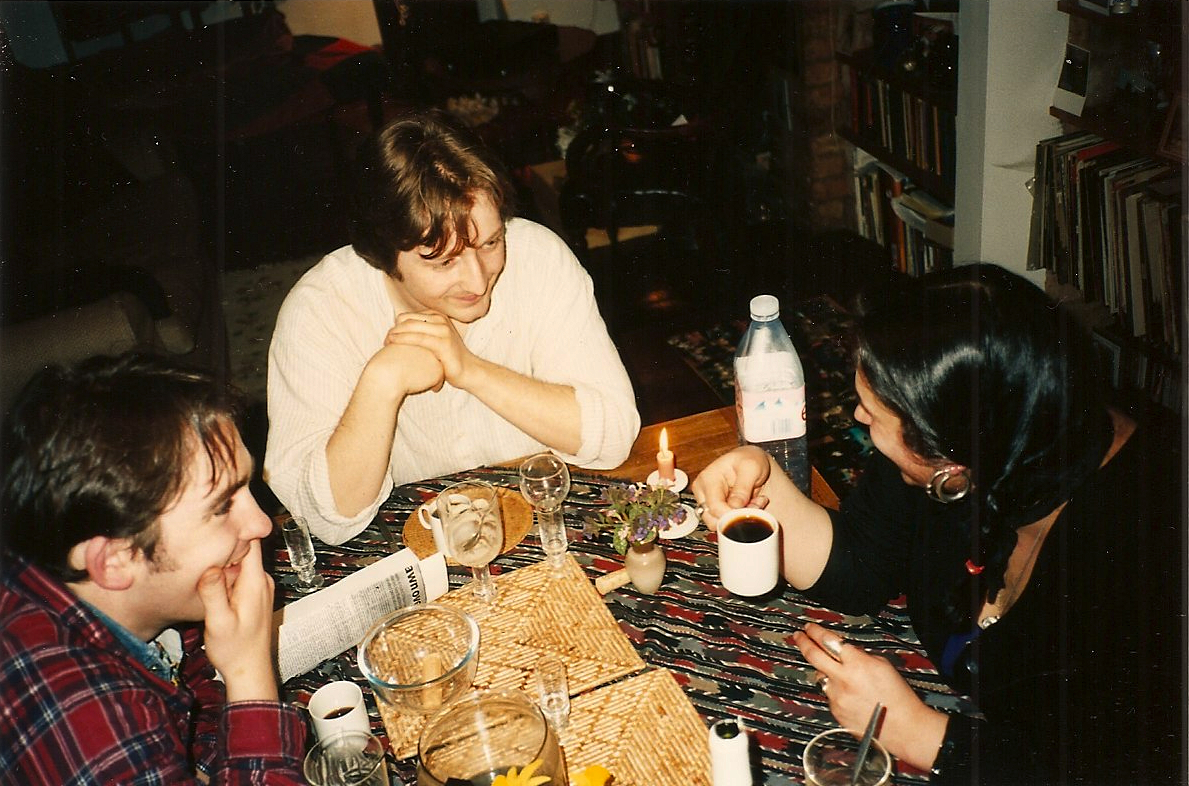
Similarly my idea of Herod as an Oxford academic, attended by four rather cute female tutorial students didn’t work. The idea of playing the scene in a different way rather than ‘in yer face’ sexy, came about because no one suitable for the usual interpretation of Herod as sex maniac turned up for audition. And I hadn’t managed to persuade the one guy I knew who would have played the part to perfection. There y’go. Can’t win ’em all!
To end with a positive comment:
‘Jackie Keirs’ method places particular demands on the chorus, who are highly individualised as they mingle with the audience, and full use is made of the building and just one stage prop, some industrial scaffolding. The result is a very moving and memorable experience of total theatre. If you think you’ve seen this piece before, you haven’t.’ Henry Blyth - Daily Information
'It's the idea of the possibilities that occur when people meet in a space like this that has been my constant inspiration, together with a deeply felt desire to allow people to experience the richness of sharing.'